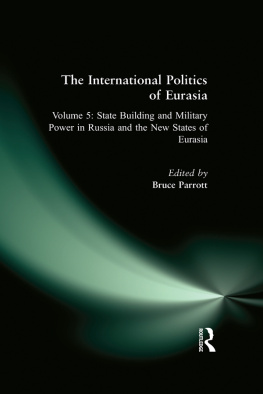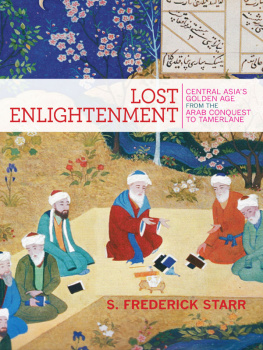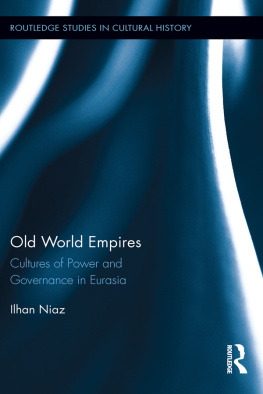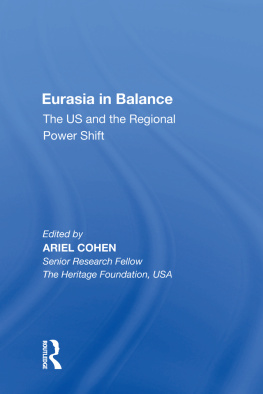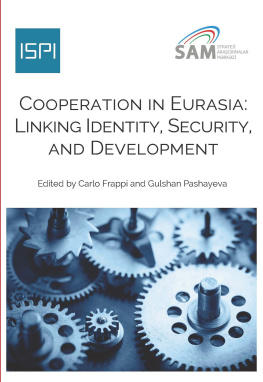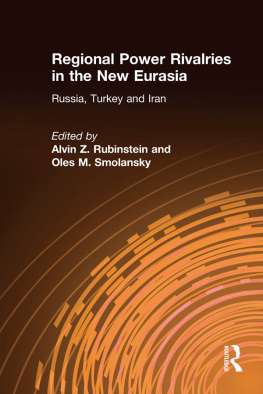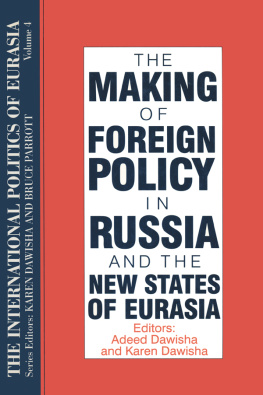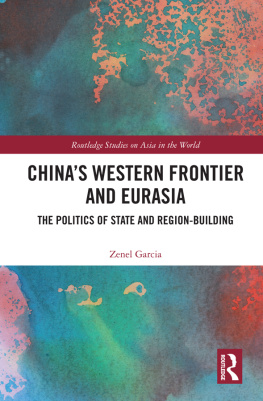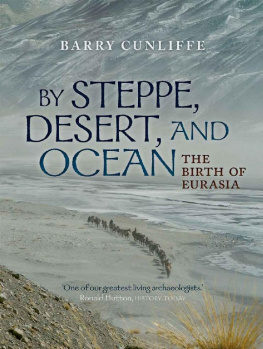STATE
BUILDING
AND
MILITARY
POWER
IN
RUSSIA
AND THE
NEW STATES
OF EURASIA
THE INTERNATIONAL POLITICS OF EURASIA
Editors:
Karen Dawisha and Bruce Parrott
This ambitious ten-volume series develops a comprehensive analysis of the evolving world role of the post-Soviet successor states. Each volume considers a different factor influencing the relationship between internal politics and international relations in Russia and in the western and southern tiers of newly independent states. The contributors were chosen not only for their recognized expertise but also to ensure a stimulating diversity of perspectives and a dynamic mix of approaches.
Volume 1
The Legacy of History in Russia and the New States of Eurasia
Edited by S. Frederick Starr
Volume 2
National Identity and Ethnicity in Russia and the New States of Eurasia
Edited by Roman Szporluk
Volume 3
The Politics of Religion in Russia and the New States of Eurasia
Edited by Michael Bourdeaux
Volume 4
The Making of Foreign Policy in Russia and the New States of Eurasia
Edited byAdeed Dawisha and Karen Dawisha
Volume 5
State Building and Military Power in Russia and the New States of Eurasia
Edited by Bruce Parrott
Volume 6
The Nuclear Challenge in Russia and the New States of Eurasia
Edited by George Quester
Volume 7
Political Culture and Civil Society in Russia and the New States of Eurasia
Edited by Vladimir Tismaneanu
THE INTERNATIONAL POLITICS OF EURASIA
Volume 5
STATE
BUILDING
AND
MILITARY
POWER
IN
RUSSIA
AND THE
NEW STATES
OF EURASIA
Editor:
Bruce Parrott
First published 1995 by M.E. Sharpe
Published 2015 by Routledge
2 Park Square, Milton Park, Abingdon, Oxon OX14 4RN
711 Third Avenue, New York, NY 10017
Routledge is an imprint of the Taylor & Francis Group, an informa business
Copyright 1995 Taylor & Francis. All rights reserved.
No part of this book may be reprinted or reproduced or utilised in any form or by any electronic, mechanical, or other means, now known or hereafter invented, including photocopying and recording, or in any information storage or retrieval system, without permission in writing from the publishers.
Notices
No responsibility is assumed by the publisher for any injury and/or damage to persons or property as a matter of products liability, negligence or otherwise, or from any use of operation of any methods, products, instructions or ideas contained in the material herein.
Practitioners and researchers must always rely on their own experience and knowledge in evaluating and using any information, methods, compounds, or experiments described herein. In using such information or methods they should be mindful of their own safety and the safety of others, including parties for whom they have a professional responsibility.
Product or corporate names may be trademarks or registered trademarks, and are used only for identification and explanation without intent to infringe.
Library of Congress Cataloging-in-Publication Data
State building and military power in Russia and the new
states of Eurasia / edited by Bruce Parrott
p. cm.(The International politics of Eurasia: v. 5)
This book is an outgrowth of a conference jointly conducted by
the Russian Littoral Project, the Department of War Studies at
Kings College, London, and the International Institute for
Strategic StudiesCIP pref.
Includes bibliographical references and index.
ISBN 1-56324-360-1 (alk. paper).
ISBN 1-56324-361-X (pbk.: alk. paper).
1. Former Soviet republicsPolitics and government.
2. National securityFormer Soviet republics.
3. Former Soviet republicsMilitary policy.
I. Parrott, Bruce, 1945. II. Series.
DK293.S73 1995
322.50947dc20 95-13179
CIP
ISBN 14: 9781563243615 (pbk)
ISBN 13: 9781563243608 (hbk)
Contents
Karen Dawisha and Bruce Parrott
Bruce Parrott
Mikhail Tsypkin
Raymond L. Garthoff
Julian Cooper
Tatiana Shakleina
Elaine M. Holoboff
Nicholas S.H. Krawciw
Taras Kuzio
Anatolii Rozanov
Jonathan Aves
Bess A. Brown
Craig Nation
Bruce Parrott
Karen Dawisha is professor of government at the University of Maryland, College Park. She graduated with degrees in Russian and politics from the University of Lancaster in England and received her Ph.D. from the London School of Economics. She has served as an advisor to the British House of Commons Foreign Affairs Committee and was a member of the policy planning staff of the U.S. State Department. She has received fellowships from the Rockefeller Foundation, the Council on Foreign Relations, and the MacArthur Foundation. She is a member of the Royal Institute of International Affairs and the Council on Foreign Relations. Her publications include Russia and the New States of Eurasia: The Politics of Upheaval (coauthored with Bruce Parrott, 1994), Eastern Europe, Gorbachev, and Reform: The Great Challenge (1989, 2d ed. 1990), The Kremlin and the Prague Spring (1984), The Soviet Union in the Middle East: Politics and Perspectives (1982), SovietEast European Dilemmas: Coercion, Competition, and Consent (1981), and Soviet Foreign Policy Toward Egypt (1979).
Bruce Parrott is professor and director of Russian Area and East European Studies at The Johns Hopkins University School of Advanced International Studies, where he has taught for twenty years. He received his B.A. in religious studies from Pomona College in 1966, and his Ph.D. in political science in 1976 from Columbia University, where he was assistant director of the Russian Institute. His publications include Russia and the New States of Eurasia: The Politics of Upheaval (coauthored with Karen Dawisha, 1994), The Dynamics of Soviet Defense Policy (1990), The Soviet Union and Ballistic Missile Defense (1987), Trade, Technology, and Soviet-American Relations (1985), and Politics and Technology in the Soviet Union (1983).
Jonathan Aves is lecturer in twentieth-century Russian studies at Sussex University in England. Previously Dr. Aves was at the Centre for Defence Studies, Kings College, in London. He received his Ph.D. in Russian history from the School of Slavonic and East European Studies, University of London, in 1989. He is a frequent visitor to and writer on the Transcaucasus.
Bess A. Brown is researcher at the Radio Free Europe/Radio Liberty Research Institute in Munich. She received her M.A. and Ph.D. from Indiana University in Uralic and Altaic Studies, specializing in contemporary Central Asia and the development of national and ethnic consciousness in nineteenth-century Hungary. Dr. Brown has been writing on developments in Central Asia since 1979.
Julian Cooper is professor and chair of Russian Economic Studies, and director of the Centre for Russian and East European Studies at the University of Birmingham. He received his Ph.D. in 1975 from the University of Birmingham. Dr. Coopers research has been focused on the former Soviet economy, industry, and science and technology policy. His most recent research is on the restructuring on the defense industrial base of Russia and the other former Soviet states.

